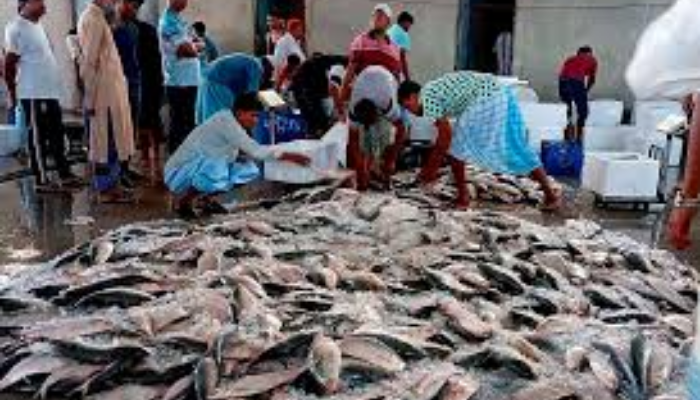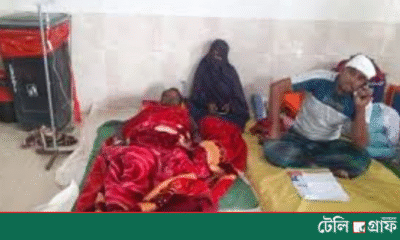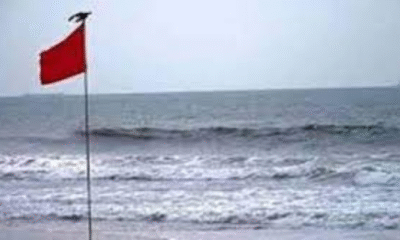Economy
Hilsa Glut Boosts Trade in Kuakata, Alipur, and Mohipur

The coastal fish markets of Kuakata, Alipur, and Mohipur are witnessing a surge in hilsa catch as fishing boats return from the Bay of Bengal with large hauls. Over the past two days, thousands of maunds of hilsa have been sold in these ports, bringing smiles to the faces of fishermen, boat owners, and traders.
According to local traders, 20–25 tons of hilsa are arriving daily. Although smaller-sized hilsa dominate the catch, prices vary depending on weight: larger fish (around 1 kg) are selling for 65,000–70,000 BDT per maund, while smaller ones fetch around 30,000 BDT.
On Wednesday evening, 20–25 trawlers returned to Alipur-Mohipur after fishing. Among them, FB Jamal landed more than 80 maunds of fish, estimated to be worth 2.4–2.5 million BDT. Other trawlers such as FB Tamanna and FB Mayer Doa also made profitable returns.
Despite the abundance, fishermen noted a shortage of larger hilsa and expressed concern over excessive trawling and use of fine-mesh nets, which they say affect the hilsa population. Fishermen have urged stricter control over trawling to ensure sustainability.
Apu Saha, Senior Fisheries Officer of Kalapara, confirmed the resurgence in hilsa availability and noted that rainfall could further boost the catch. Traders believe current market conditions are benefiting all stakeholders in the coastal fisheries industry.
Economy
Giant 32-kg Poa Fish Caught Near St Martin’s; Fisherman Demands Tk 600,000

A 32-kg giant poa fish was caught in the net of fisherman Abdul Goni near Saint Martin’s Island in Teknaf on Saturday morning (22 November). The fish was caught around 10:30am and is now being negotiated for sale, with Goni demanding between Tk 500,000 and Tk 600,000.
Goni, a resident of Ward-5 in Saint Martin’s Union, said he was out fishing as usual when the large poa fish became trapped in his net. The catch has drawn crowds of locals eager to see the rare specimen, though it has not yet been sold.
He added that large poa fish have been appearing in his nets for several years, enabling him to become financially independent. Locals now call him “Poa Goni” for his frequent big catches.
According to Teknaf Upazila Fisheries Officer Md Delowar Hossain, the fish contains a valuable organ called “padna” or “fola,” which is dried and exported as raw material for pharmaceutical use. This makes poa fish significantly more valuable than regular fish.
Economy
Late-Night Fire at Grameen Bank in Magura; Quick Response Prevents Major Damage

A fire broke out at the Grameen Bank branch in Mohammadpur upazila of Magura in the early hours of Monday, around 3:30am. Quick action by the police, the fire service and local residents brought the blaze under control, preventing major damage to the institution.
According to Billal Hossain Mridha, sub-officer at the Mohammadpur Fire Service Station, the fire originated at the bank located beside Aminur Rahman Degree College. Several essential documents and pieces of furniture were damaged before firefighters managed to douse the flames. The cause of the fire has not yet been confirmed, and an investigation is underway.
Mohammadpur Police Station Officer-in-Charge Md Abdur Rahman said officers reached the scene immediately upon receiving the alert. With the joint effort of police and firefighters, the fire was brought under control. He added that investigators are working to determine whether the fire was accidental or deliberate. The extent of the damage will be assessed after the investigation.
Economy
Wave of Arson Hits Grameen Bank Branches as Attacks Spread to Kishoreganj

A series of arson attacks targeting Grameen Bank branches has expanded from Gazipur and Bogura to Kishoreganj, where masked assailants set fire to the institution’s Jashodal branch on Sunday night. CCTV and mobile footage showed a man shouting “Joy Bangla” before igniting the ground floor of the building. Locals quickly extinguished the flames, preventing major losses.
Earlier the same night in Pakundia’s Sriramdi area, a large litchi tree was felled across the road, blocking traffic on the Kishoreganj–Pakundia route. Witnesses alleged that activists of the banned Awami League arrived on motorcycles and cut the tree while chanting political slogans. Police later cleared the road and restored movement.
At dawn on Monday, a deserted ambulance parked in front of the Kishoreganj Civil Surgeon’s Office was set ablaze, with similar slogans heard during the attack. Fire service officials reported that much of the vehicle had already burned before they arrived.
Police have confirmed all three incidents in Kishoreganj.
The attacks follow previous arson attempts on Grameen Bank branches in Gazipur’s Maona–Sripur area and Bogura’s Sherpur, where petrol bombs damaged signage and important documents. Authorities say security measures around bank branches in affected districts have now been tightened.
-

 People and Culture1 day ago
People and Culture1 day agoWedding Invitation Dispute Sparks Violent Clash in Jhenaidah; 10 Injured
-

 People and Culture1 day ago
People and Culture1 day agoFive Dead as Strong Quake Jolts Bangladesh; Dhaka at Major Risk
-

 Economy1 day ago
Economy1 day agoGiant 32-kg Poa Fish Caught Near St Martin’s; Fisherman Demands Tk 600,000
-

 International17 hours ago
International17 hours ago24 Killed in Israeli Strikes Despite Gaza Ceasefire
-

 Weather1 day ago
Weather1 day agoLow-Pressure Likely Over South Andaman Sea as Temperatures Set to Dip




